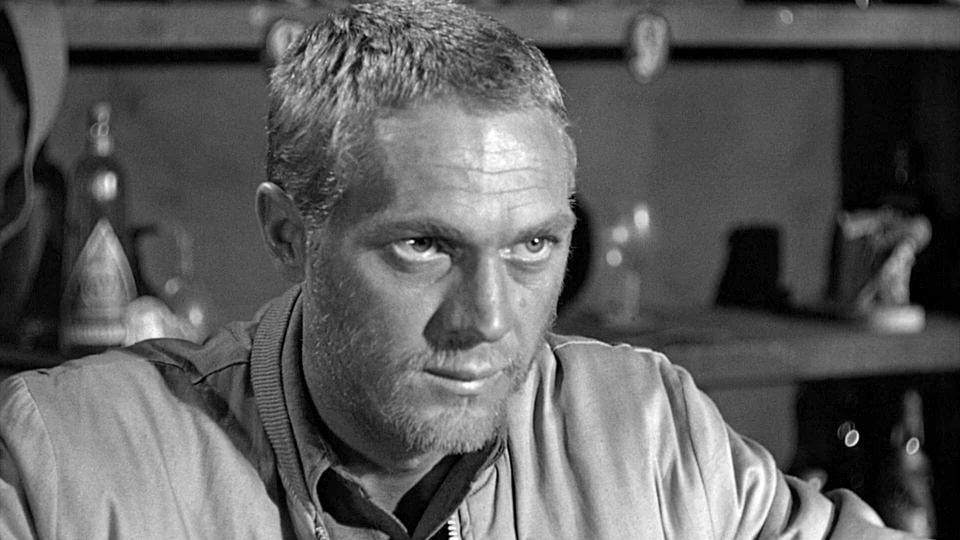Hell Is for Heroes

Hell Is for Heroes tells the story of a small squad of American soldiers. It’s 1944 and the group has seen its share of action on the European lines. Now, they’re enjoying a break in a bombed-out village near the Siegfried Line.
Private John Reese, played by Steve McQueen, arrives with orders to join the squad. Reese, a former master sergeant demoted to private for insubordination, wastes little time alienating himself from the rest of the men. Rumors swirl that the squad’s next orders will send them home. The men are giddy. Reese is forlorn. The war has become his life. Later that night, he disobeys orders and heads into town for a drink.
But, of course, the squad doesn’t go home. Orders come through sending them back to the line. Reese brightens. On the line, he’s calm but vigilant. An exemplary soldier. Good thing, because the existing American forces soon withdraw, leaving the squad horribly outnumbered. The men rig up a series of schemes to project an illusion of strength, but the Germans soon discover the truth.
Knowing the undermanned squad can’t withstand the inevitable German assault, Reese pushes for an attack on a German pillbox across the line. This would force the Germans into a defensive position, giving the squad a fighting chance. Reese gets orders to stay put while the acting officer leaves to notify command. Reese disregards these orders and convinces two other squad members to join him in a stealth raid. Acting without orders, the men make their way across the mine-leaden no-man’s land with disastrous results.
Given its troubled production, the film should have been a disaster. Robert Pirosh wrote the script and planned to produce and direct. Once McQueen came aboard, the two clashed over script changes. McQueen wanted the other men’s roles diminished and his beefed up. McQueen got his way and Pirosh walked. The studio installed Don Siegel as director. McQueen’s antics had already alienated him from most of the cast, and he clashed with Siegel and the studio as production went on.
And yet, the film works. Unlike the heroic melodrama typical of the genre, Hell Is for Heroes features a dark, nihilistic undercurrent. During one of the film’s most powerful scenes, a soldier screams “MY GUTS!” while clutching his stomach after getting shot. The performance is gripping. The screams go on. Pain gives way to panic. Mania creeps into the soldier’s voice. It would be painful to watch if there were actual blood. But instead we’re given bloodless wounds and carnage-free explosions.
To this end, Hell Is for Heroes looks like a B-movie. The sweltering northern California woods can only suggest the muddy forests of Germany. During firefights, men stiffen up and fall over to simulate getting shot. Before the climatic battle, we’re shown low-quality stock footage of artillery firing.
But McQueen’s performance transcends the shoddy production. He doesn’t say much. Instead, he uses his eyes and body language to show us Reese’s feelings. It’s a riveting turn that’s equal parts cold detachment and tumultuous emotion. Watching the film, one is hard pressed to disagree with McQueen’s insistence that the script focus on him. He carries the film.
The only performer who comes close to matching McQueen is James Coburn. Coburn plays Henshaw, a habitual tinkerer struggling with the destruction inherit in war. His defining scene sees him manning a flame-thrower, fighting back manic laughter as he incinerates a group of trapped German soldiers. It’s a haunting visage that foreshadows the star Coburn would later become.
Granted, not all the performances are winners. Nick Adams overplays his part as a Polish refugee. His scenes bleed into melodrama. And Bob Newhart looks lost doing a variation of his standup shtick. But the film overcomes these stumbles to finish strong.
According to multiple accounts, the finale was an accident. The production simply ran out of money and couldn’t shoot any more footage. Yet, it’s the perfect, morally ambiguous, ending to punctuate the film’s madness-of-war message. The men charge forward as the camera zooms in. The war goes on, even as the film comes to an end. The flimsy production and awkward comedy fade in our memory as we’re left to ponder the significance of a single pillbox and all the lives it cost.